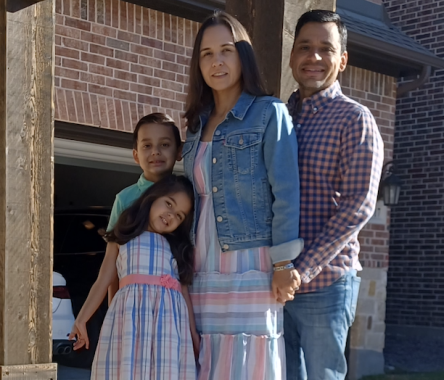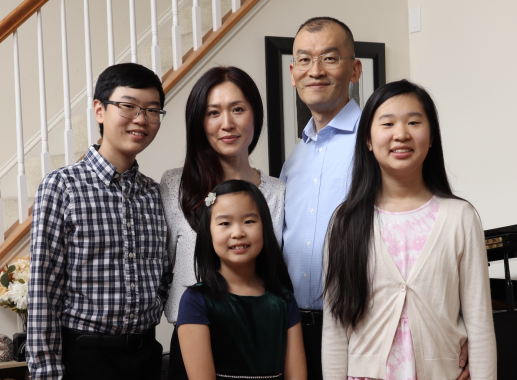
Parenting Paradigm
By Thomas and Hannah Luttrell
The hospital lights were dim, and medical equipment hummed quietly. I (Hannah) was still groggy from my emergency C-section just hours before. Our baby’s heart rate had suddenly dropped, and I had been rushed into the operating room.
The nurse gently tried to rouse me again. “You need to wake up,” she said urgently. “Your baby needs you.” My sleepy protests that I had just survived a major surgery and needed some rest evaporated with the cries of a less-than-five-pound bundle whose needs clearly trumped my own. I had become a parent! Life would never be the same again.
A Challenging Responsibility
However dramatic or drama-free your induction into parenthood was, nothing can quite prepare you for the challenges ahead. “It’s incredibly hard being a parent,” admits Alyssa Truman (pictured left with her family), a member of Chesapeake Conference’s Spencerville church in Silver Spring, Md., mother of three teenage daughters and assistant communication director for the General Conference of Seventh-day Adventists. “I have to balance the needs of my children with the needs of my spouse, [Trent], the demands of work—and still make time for self-care!”
Ruben Gandia, also a Spencerville member and an attorney who is father to Mateo, 8, and Ana Sofia, 5, says, “There’s a lot of joy but also a lot of worry. There is a new level of anxiety and exhaustion that I never experienced before having kids!”
His wife, Claudia Pina, a stay-at-home mom, agrees. “It’s rewarding but demanding. … Being a parent is such a huge responsibility to … make sure they turn out well—a responsibility not just to them but to God who entrusted them to us.”
Trying to control an autonomous “mini-me” with a firm opinion of their own is much easier said than done, and it doesn’t get any easier, says Alyssa. “My teenagers have told me things that were honestly challenging to hear as a parent, but I try and make sure my first response is always, ‘I love you.’ I want them to know that their behavior is not a condition for my love.”
Nancy Hwang, a member of Chesapeake Conference’s Westminster church who homeschools her son, Caleb, 14, and two daughters, Mary, 12, and Martha, 8, adds, “Being a parent is very humbling. When you see how even Bible characters like Abraham sinned, you wonder, How do I avoid passing my own failings down to my kids?”
Less-Than-Ideal Circumstances
In some ways, it’s encouraging to realize the Bible portrays no perfect family. While it provides principles and structures for families to thrive, it is also filled with stories of less-than-ideal families, from polygamous fathers to jealousy-filled siblings. It’s an honest portrayal of the real world.
Today, many families don’t fit what Adventists have traditionally considered “ideal.” Besides traditional nuclear families, there are blended and single-parent families resulting from divorce or death of a parent, and even families led by cohabiting, unmarried couples. No matter what your current family structure is, all families have the potential for both successes and challenges.
Some children of divorce argue that their parents’ divorce gave a welcome end to constant conflict in a toxic home environment. While it is clear the Bible intended for marriage to be lifelong, an empty marriage filled with bitterness is also far from what God intended. As a family therapist, I (Thomas) see firsthand how the breakdown in the family, the rejection of the other parent, emotional avoidance and a toxic or abusive environment can all have a detrimental impact on children, whether it culminates in divorce or not.
Happy marriages and families are rarely accidental. When red flags arise, take the time to find help, whether through a supportive community, books by experts or seeking professional services.
Setting the Stage
In many ways, the best foundation parents can provide for their children starts before children come into the picture. Premarital counseling gives every new couple a distinct advantage. Discussing values and beliefs about family management before having kids will help ensure the couple enters into parenting on the same page.
It is also beneficial to assess the positive and negative things learned from one’s parents. For instance, Trent, a freelance graphic designer, recalls his parents put a lot of emphasis on “memorable moments,” something he tries to replicate in taking his daughters out on dates and going on family trips across the country. On the other hand, while his parents provided materially for him and his siblings, he can’t ever recall his father saying “I love you” to him as a child. As a result, every night he tells his three girls he loves them, even calling 18-year-old Moraya, a freshman at Andrews University (Mich.), to say those three words.
Helping Your Kids Define Their Faith
Ruben and Claudia (pictured right with their children) were raised in strict Hispanic Seventh-day Adventist households. For Ruben, the intense Adventism approach and being forced to be an example to others made him want to rebel and do just the opposite.
Now as parents, they want to make sure their children see Sabbath as enjoyable, not restrictive. “We try and convey to our children the principle that Sabbath is a day to get closer to God, to fellowship with friends and family, to rest and do different things that you don’t normally get a chance to do on weekdays,” says Ruben.
“Growing up, we couldn’t turn on the TV on Sabbath,” adds Claudia. “Now we watch Christian or nature movies. We have worship, play music and read stories.”
Alyssa shares, “We’ve had to allow our kids to shape Adventism for themselves, even if it’s not always convenient.” She drives to various church services on Sabbath to cater to the different needs of her children. “The long game is, if I want my kids to stay in the church and fall in love with Sabbath, I may need to find out-of-the-box ways to help accomplish that.” As a result, the family has spent many Sabbaths visiting historical national parks—seeing much of the United States.
Nancy’s husband, Zune, an Army family medicine physician, adds, “We try and do family worship every day at bedtime … and read the Sabbath School lesson. We talk about it, then write a paragraph on what we learned. I believe that the Bible and prayer are at the core of training up a child with a spiritual perspective, equipping them to naturally apply biblical principles to life.”
Training and Correction
Just as Christians want to be “disciples” of Christ, all parents should be concerned with discipline. After all, “discipline” is simply about helping children learn to be self-controlled.
Ruben notes, “As [our children] get older, it’s crucial they know how to [be disciplined and how to] structure themselves and manage their time.”
Zune agrees. “I’m a firm believer in the idea that children need to be trained. … It’s simply not enough just to place children in a nurturing environment. The goal is really to help children develop their own sense of self-discipline.”
The subject of discipline tends to be influenced a lot by our culture. Spanking is a hotly debated topic that is more acceptable in some countries than others. Research has shown that spanking tends to produce negative effects on children. This would differ from some Christians who advocate for prayerfully talking with a child before spanking them. However, the research also points out that the problem is that most parents who spank their children do so out of anger or impatience, conveying the idea that it is OK to lash out when angry, rather than being a corrective, last-resort option. Punishing children rarely works as an effective way to change behavior or motivate a child. Many times, it just makes children afraid. As parents, we need to learn alternative strategies to mold our children besides relying on punishments.
In the classic parenting book Child Guidance, Ellen White says: “Be so calm, so free from anger, that they will be convinced that you love them, even though you punish them. … Never give your child a passionate blow, unless you want him to learn to fight and quarrel. As parents you stand in the place of God to your children, and you are to be on guard.” (Read more on pages 249–252.)
Both Ellen White and current research support the concept that the ideal way to motivate a child is through positive reinforcement. This is not bribing a child, which can unfortunately have the opposite effect of teaching a child to only respond when they are rewarded. Positive reinforcement means giving children positive attention when they are doing good things and using incentives to bring out the best in them. A warm and loving relationship that maintains expectations is a more effective and “authoritative” parenting style than an “authoritarian” parenting style that merely asserts dominance.
“When my kids break something, I always try and make sure my first question is, ‘Are you OK?’ shares Alyssa. “I want them to know that the object is never more important than the child.”
Fighting Against Passive Parenting
Too often, parents leave the parenting to schools or electronic devices and media, passively allowing their children to entertain themselves for the sake of convenience. It’s easy to complain about the influence of social media rather than to take responsibility for being involved in our children’s lives.
For the Hwang household (pictured above), Nancy and Zune learned that their kids operate best on a limited media diet. “We realized that after our children watched certain videos, their behavior and how they related to us as parents was notably worse,” shares Zune. Instead, Nancy says, “In our spare time and on Sabbaths, we try and spend quality family time together in service activities, visiting with others and going for walks.”
Alyssa says, “Being present and showing an interest in what they are doing makes all the difference. … I’ve learned that I need to listen more and talk less, because if I don’t listen, they stop speaking, and especially as they became teenagers and young adults, it is even more important to be able to have those open conversations with them. They need to know they can come to me, knowing they are loved and not judged.”
We Need Parenting Too
I (Hannah) always thought I was a patient person—until I became a parent! Just as we seek to train and discipline our children, God seeks to train and discipline us through our children.
Hebrews 12:9–10 reads, “We have all had human fathers who disciplined us and we respected them for it. How much more should we submit to the Father of spirits and live! They disciplined us for a little while as they thought best; but God disciplines us for our good, in order that we may share in his holiness” (NIV).
Zune couldn’t agree more. “When I first got married, my wife helped me understand the New Testament—what it means to selflessly love her as Christ loved the church. But when I became a parent, the stories of the Old Testament really took on flesh and blood, and I began to fully appreciate what it meant to love my children as God loved His ‘children of Israel’, along with all the patience and disciplining it involves!”
While none of us had perfect earthly parents, knowing that God is the perfect parent who loves and forgives us when we make mistakes, empowers and motivates us to be the best parents possible. “Ultimately, we want to be even better than our parents were at raising us,” says Trent, “and hopefully when our children become parents, they will be better than us!”
___________________________________________________________________
Meet Our Contributors

Thomas Luttrell is a licensed clinical marriage and family therapist and an associate professor of psychology and counseling at Washington Adventist University. Hannah Luttrell is a producer for Hope Channel and a freelance writer. They are the proud parents of Caleb, 5, and Luke, 2, and run an online parenting support group at facebook.com/groups/parentingparadigm.
In the May/June 2023 Columbia Union Visitor feature, we delve into what it’s like to raise children in less-than-ideal circumstances, how to fight against passive parenting, and what parents can do to help their kids define their faith.

- Feature: Parenting Paradigm
- Editorial: We're Parents; Now What?
- 30 Columbia Union Church Plants Get Portable Baptistries
- Columbia Union Hosts First Evangelism Directors’ Meeting
- Amish Bible Correspondence School Launched
- Who's Preaching at the 2023 Columbia Union Camp Meetings?
- Need Ideas to Make Sabbath Special?
- Parenting From a Kids’ Perspective
- Why You Should Consider Participating on 'No-Mow May'
- Read More Articles From The Issue

Add new comment